
On April 2, 1018, New York University’s NYU Office of Global Spiritual Life hosted a night of discussion with world-renowned spiritual leader Eckhart Tolle. The event was held at the university’s Skirball Center for the Performing Arts. Throughout the night, the prolific writer of spiritual philosophy shared uplifting words of wisdom while in conversation with Reka Prasad, Assistant Director of MindfulNYU and the NYU Office of Global Spiritual Life. Tolle is a New York Times bestselling author, whose book, “The Power of Now: A Guide to Spiritual Enlightenment” is one Oprah calls “one of the most transformative books, I’ve ever read” and “essential reading.” Needless to say, Tolle posited many thought-provoking insights that offered much food for thought. We rounded up our top five Eckhart Tolle quotes you’ll want to keep on-hand for your next soul-searching session.
1. We are innately formless beings.
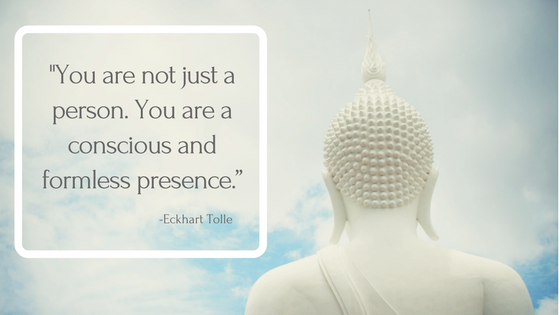
According to Tolle’s “The Power of Now,” we are not our minds nor bodies. Tolle maintains that “you” are essentially an inner awareness or presence, a sort of “unconditioned consciousness.” Based on this teaching, I believe it’s the inner awareness that experiences the mind and body, not the other way around. Moreover, the mind and body are our possessions. They are not our identities.
To be conscious is not only to be aware of the outside world but also to be awake to the presence inside of you. To strengthen this awakening is to tap into presence as much as possible. According to Tolle, presence is accessible to you at all times for the very reason that you are presence. As such, we are so much more beyond our physical natures. We are, in fact, “formless,” as Tolle says, because presence cannot be held or touched. It can only be accessed and experienced by you, through you and as you.
[READ RELATED: Yoga: It’s More Than Lululemon and the Asanas]
2. Our hardships have purpose.
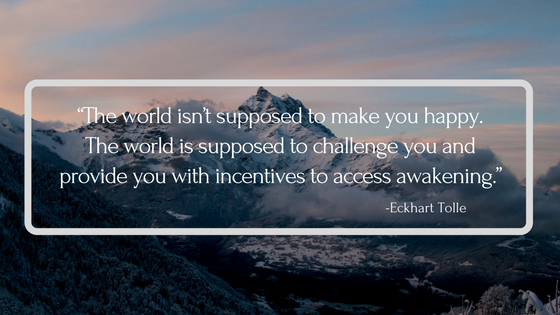
This nugget of wisdom was one of the most profound of the night. Tolle emphasized how most of us have become increasingly dependent on the world for our happiness. He then spun off to suggest that the world is actually meant to do the exact opposite—to provide us with challenges.
I believe Tolle is suggesting that the world is an “enjoyable maze” that can trip you up with dead-ends but truly wants you to succeed. Each dead-end is merely an incentive for you tap into your presence, to reset and to reconsider an alternative path. The more dead-ends you run into, the more incentives you have to strengthen your bond with your inner self and in turn grow your consciousness.
If you can remember to enjoy the maze and accept that running into dead-ends is inevitable, you are heading down the right path—a path to create your own happiness.
[READ RELATED: Using the ‘Law of Attraction’ to Attract Happiness into my Life]
3. Perception isn’t the same as interpretation.
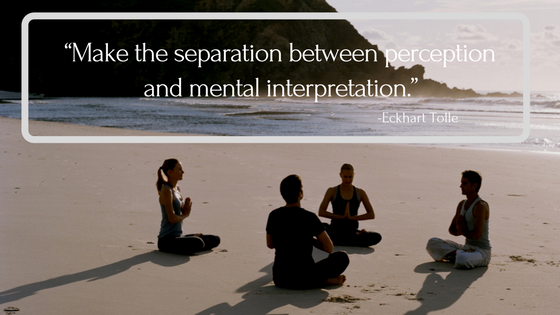
Perception is what you see. Mental interpretation is the judgment you make about what you see. Based on this judgment, you emote what you think and feel.
In defining the concepts, Tolle not only emphasized how they were different but also stressed that we must remember they are separate. When we forget to isolate the two, we are likely to make a more premature or negative judgment. However, when we take a moment to perceive before deciding how we feel, we’re more likely to make a more sound judgment.
For example, if I see that my roommate has started to smoke cigarettes, that’s my perception. I might make a snap judgment that my roommate is depressed (mental interpretation). But in doing so, I’d be forgetting to make the separation between perception and mental interpretation. In reality, there could be many reasons why roommate started smoking—none of which may have to do with his mental health. Or maybe they do. The point is I don’t know, and I shouldn’t make a judgment based on my perception alone. Keeping this in mind when making any new observation, I’m reminded to make more careful, non-presumptuous, non-negative judgments.
[READ RELATED: Fly with Psychotherapy and Spirituality: 4 Judgments Blocking Success and Happiness]
4. Our egos are a hindrance to enlightenment.
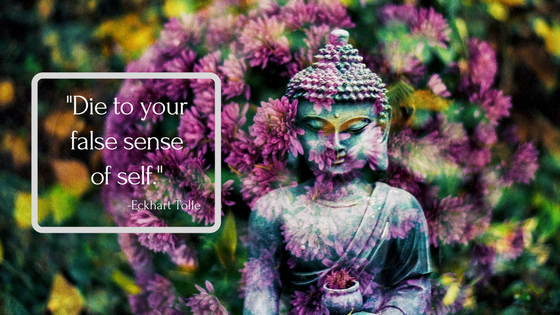
The last 15 minutes of the evening was dedicated to a Q&A session with questions that were submitted prior to the event. The last question was from an NYU student and read, “What would you advise someone who wants to be a spiritual leader like yourself?”
Tolle responded thoughtfully and modestly. His answer revolved around the idea that we must live the life we teach and that we must be conscious at all times. He then went on to say how we must die to their false sense of self in order achieve true inner awareness.
I found this extremely fascinating. I believe this calls for the complete disintegration of the ego or the decomposition of all that isn’t in support of the growth of inner consciousness. It’s arguable that to be a spiritual leader all biases, beliefs, judgments, opinions and alike must be eradicated from your world view. This circles back to the first teaching—that we are so much more than our bodies and minds, our actions and thoughts. These represent a “false sense of self.”
5. We are mediums of expression for the universe.
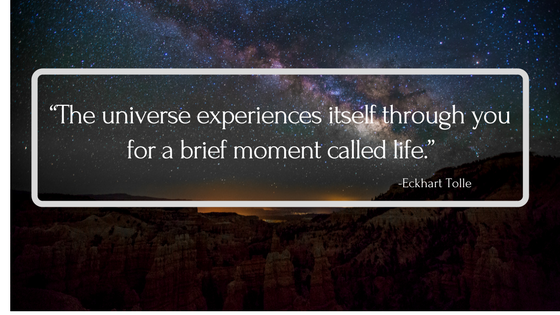
Even science can concur with this one. Famed astrophysicist Neil deGrasse Tyson once said, “We are part of this universe. We are in this universe, but perhaps more important than both of those facts, is that the universe is in us.”
Similarly, Tolle expounds that we do not experience the universe. Rather, the universe experiences itself through us. We are simply the mediums through which the universe expresses itself. And we are all unique expressions of the universe only here for a “brief moment called life”.
There is a another powerful quote by Gautama Buddha, the founder of Buddhism, which speaks to the brevity of this very moment.
“This existence of ours is as transient as autumn clouds.
To watch the birth and death of beings is like
looking at the movements of a dance.
A lifetime is like a flash of lightning in the sky,
rushing by like a torrent down a steep mountain.”
Spiritual author Deepak Chopra expands a little further, “Life is eternal. But the expressions of life are ephemeral, momentary, transient. We have stopped for a moment to encounter each other, to meet, to love, to share. If we share with caring, lightheartedness, and love, we will create abundance and joy for each other. And then this moment will have been worthwhile.”
 Kavi Bhatia is a senior at New York University studying communicative sciences, psychology and human development. He enjoys learning about personal development and wellness, spirituality, philosophy and mindfulness. He is an aspiring writer and performance psychologist who is driven to help individuals and organizations achieve at an optimal level. In his spare time, he loves to read, write, play basketball and watch the Yankees play. Follow him on Instagram at @kavi_bhatia.
Kavi Bhatia is a senior at New York University studying communicative sciences, psychology and human development. He enjoys learning about personal development and wellness, spirituality, philosophy and mindfulness. He is an aspiring writer and performance psychologist who is driven to help individuals and organizations achieve at an optimal level. In his spare time, he loves to read, write, play basketball and watch the Yankees play. Follow him on Instagram at @kavi_bhatia. 



